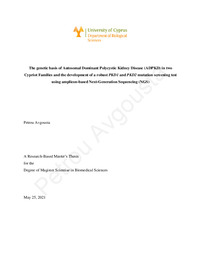| dc.contributor.advisor | Deltas, Constantinos | en |
| dc.contributor.author | Petrou, Avgousta | en |
| dc.coverage.spatial | Cyprus | en |
| dc.creator | Petrou, Avgousta | en |
| dc.date.accessioned | 2022-02-16T09:51:51Z | |
| dc.date.available | 2022-02-16T09:51:51Z | |
| dc.date.issued | 2021-06-11 | |
| dc.identifier.uri | http://gnosis.library.ucy.ac.cy/handle/7/65087 | en |
| dc.description.abstract | Autosomal dominant polycystic kidney disease (ADPKD) is one of the most common hereditary kidney diseases, with a frequency of 1 in 1000 people in the general population. This progressive disorder is mainly caused by mutations in two genes: PKD1, accounting for 75-85% of the cases, and PKD2, responsible for the rest. More types of the disease also exist. ADPKD main features are the formation of cysts in the kidneys and a gradual age-related loss of kidney function; as disease progresses, cysts replace the functional renal parenchyma, ultimately leading to end-stage renal disease (ESRD) in 50% of the cases.
The purpose of this study was the genetic investigation of two Cypriot families, clinically diagnosed with ADPKD. Candidate PKD1 and PKD2 genomic regions were investigated in family CY1611 by linkage analysis, a method based on the analysis of polymorphic genomic markers flanking the PKD1 and PKD2 gene loci. Reportedly, family CY1611 demonstrated linkage to the PKD1 gene locus. Family CY1626 was previously known to be linked to the PKD2 gene locus, hence PKD2 gene was directly analyzed by Sanger Sequencing in search for mutations. Variants found by sequencing were assessed by using prediction algorithms and variant databases. No mutations were found in PKD2 in CY1626 family members explaining their clinical diagnosis.
Screening PKD2 for mutations by Sanger Sequencing is a feasible task, but unfortunately the genomic characteristics of PKD1 impede accurate and prompt genetic screening by sequencing, not only because of the high GC content of its exons but also for the existence of multiple homologs in the genome and pseudogenes. To overcome this significant problem with PKD1 sequencing, we aimed at developing a pipeline were long-range PCR amplification of PKD1 and PKD2 exonic regions paired with amplicon-based Next-Generation Sequencing (NGS) can allow the simultaneous screening of both genes by semi-conductor NGS technology. | en |
| dc.language.iso | eng | en |
| dc.publisher | Πανεπιστήμιο Κύπρου, Σχολή Θετικών και Εφαρμοσμένων Επιστημών / University of Cyprus, Faculty of Pure and Applied Sciences | |
| dc.rights | info:eu-repo/semantics/openAccess | en |
| dc.rights | Open Access | en |
| dc.title | The genetic basis of Autosomal Dominant Polycystic Kidney Disease (ADPKD) in two Cypriot Families and the development of a robust PKD1 and PKD2 mutation screening test using amplicon-based Next-Generation Sequencing (NGS) | en |
| dc.type | info:eu-repo/semantics/masterThesis | en |
| dc.contributor.committeemember | Georgiades, Pantelis | en |
| dc.contributor.committeemember | Pitsouli, Chrysoula | en |
| dc.contributor.department | Τμήμα Βιολογικών Επιστημών / Department of Biological Sciences | |
| dc.subject.uncontrolledterm | AUTOSOMAL DOMINANT POLYCYSTIC KIDNEY DISEASE (ADPKD) | en |
| dc.subject.uncontrolledterm | GENETIC INVESTIGATION | en |
| dc.subject.uncontrolledterm | NEXT-GENERATION SEQUENCING | en |
| dc.author.faculty | Σχολή Θετικών και Εφαρμοσμένων Επιστημών / Faculty of Pure and Applied Sciences | |
| dc.author.department | Τμήμα Βιολογικών Επιστημών / Department of Biological Sciences | |
| dc.type.uhtype | Master Thesis | en |
| dc.contributor.orcid | Deltas, Constantinos [0000-0001-5549-9169] | |
| dc.contributor.orcid | Pitsouli, Chrysoula [0000-0003-4074-9684] | |
| dc.contributor.orcid | Georgiades, Pantelis [0000-0001-6497-3221] | |
| dc.gnosis.orcid | 0000-0001-5549-9169 | |
| dc.gnosis.orcid | 0000-0003-4074-9684 | |
| dc.gnosis.orcid | 0000-0001-6497-3221 | |

